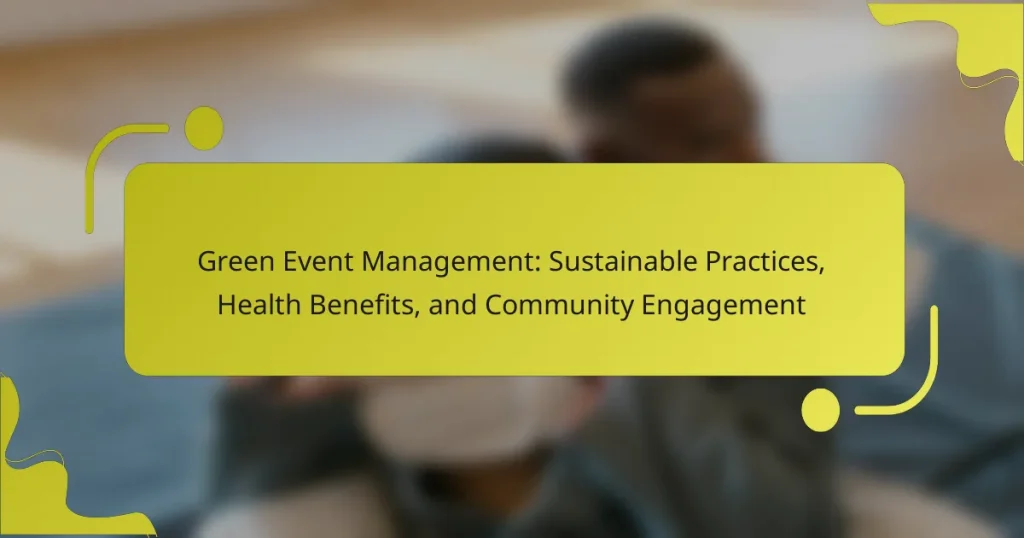Green event management focuses on sustainable practices that benefit the environment and community. It emphasizes waste reduction, energy conservation, and local product sourcing. Health benefits include improved air quality and increased physical activity. Community engagement enhances participation and awareness, driving positive environmental impact.

What are the key principles of green event management?
Key principles of green event management include reducing waste, conserving energy, promoting local products, and engaging the community. These practices enhance sustainability, improve health outcomes, and foster community relationships. For example, using digital tickets minimizes paper waste, while sourcing food locally supports nearby businesses. Engaging attendees in sustainability initiatives can increase awareness and participation, creating a positive impact. Implementing these principles leads to more environmentally responsible events that benefit all stakeholders.
How do sustainable practices impact event planning?
Sustainable practices significantly enhance event planning by reducing environmental impact and promoting community well-being. Implementing green strategies, such as waste reduction and energy efficiency, fosters healthier environments. These practices also encourage local engagement, creating a sense of community ownership and support. Events that prioritise sustainability often attract eco-conscious attendees, enhancing their overall appeal and success.
Which resources are essential for implementing green initiatives?
Essential resources for implementing green initiatives in event management include sustainable materials, energy-efficient technologies, waste management systems, and community partnerships. These resources help reduce environmental impact, enhance attendee experience, and promote social responsibility. Collaboration with local suppliers and organisations can amplify the effectiveness of these initiatives.

What health benefits are associated with green events?
Green events offer numerous health benefits, including improved air quality, enhanced physical activity, and increased community well-being. Sustainable practices reduce pollution and promote healthier environments. For example, outdoor green events encourage walking and cycling, fostering active lifestyles. Additionally, community engagement strengthens social ties, contributing to mental health.
How can green events promote physical well-being?
Green events promote physical well-being by encouraging active participation and fostering healthy habits. Participants often engage in outdoor activities, which enhance cardiovascular health and reduce stress. Sustainable practices, such as using local food sources, provide nutritious options that benefit overall health. These events also create a sense of community, leading to social connections that contribute to mental well-being. Engaging with nature during these gatherings can boost mood and increase physical activity levels, ultimately supporting a healthier lifestyle.
What mental health advantages can arise from eco-friendly gatherings?
Eco-friendly gatherings can enhance mental health by reducing stress and fostering community connections. Participants often experience improved mood and well-being through nature exposure and sustainable practices. Engaging in green events promotes a sense of purpose, belonging, and environmental responsibility. Research indicates that activities in natural settings can lower anxiety levels and improve overall mental clarity. These gatherings also encourage social interactions, which are vital for mental resilience and support networks.

How does community engagement enhance green event management?
Community engagement significantly enhances green event management by fostering collaboration and shared responsibility. Engaging local communities promotes awareness of sustainability practices, leading to increased participation and support. This involvement can improve event visibility and attract more attendees, ultimately driving positive environmental impact. Additionally, community engagement can yield unique insights into local needs, ensuring events are tailored to promote ecological and social benefits effectively.
What role do local partnerships play in sustainability?
Local partnerships significantly enhance sustainability in green event management by fostering collaboration and resource sharing. These partnerships enable access to local expertise, reduce carbon footprints, and promote community engagement. By working with local businesses and organisations, events can utilise sustainable materials, support the local economy, and increase awareness of environmental issues. This collaborative approach not only benefits event organisers but also strengthens community ties and encourages collective action towards sustainability goals.
How can community feedback shape event practices?
Community feedback significantly shapes event practices by informing organisers about preferences and expectations. Engaging with attendees fosters sustainable practices, enhancing overall event quality. Feedback can lead to improvements in waste management, resource allocation, and community involvement. As a result, events become more aligned with community values, promoting health benefits and environmental awareness. Integrating this input into planning creates a unique attribute of responsiveness, which can differentiate successful events from others.

Which unique attributes differentiate successful green events?
Successful green events are distinguished by their commitment to sustainability, community involvement, and innovative practices. Unique attributes include the use of renewable resources, zero waste initiatives, and local sourcing of materials. These elements not only reduce environmental impact but also enhance participant engagement and awareness. Additionally, successful green events often incorporate educational components that promote sustainable practices among attendees.
What innovative technologies are being used in sustainable event management?
Innovative technologies in sustainable event management include digital ticketing, virtual platforms, and eco-friendly materials. These advancements minimise waste and enhance attendee engagement. For example, mobile apps streamline event logistics while reducing paper usage. Additionally, renewable energy sources power venues, further supporting sustainability goals.
How do cultural factors influence green event practices in different regions?
Cultural factors significantly influence green event practices across regions. Local values, traditions, and community priorities shape how sustainability is perceived and implemented.
For example, in regions with strong environmental movements, events may prioritise zero waste and renewable resources. Conversely, in areas where economic challenges dominate, cost-effective solutions may take precedence over comprehensive sustainability measures.
Community engagement varies as well; regions with a collaborative culture often see higher participation in green initiatives. Additionally, cultural attitudes towards nature and resource conservation can dictate the types of sustainable practices adopted.
Finally, educational outreach tailored to cultural contexts enhances awareness and support for green event management, leading to more effective implementation of sustainable practices.

What are the rare but impactful practices in green event management?
Rare but impactful practices in green event management include zero-waste strategies, community sourcing, and eco-friendly transportation. These practices significantly reduce environmental footprints and enhance community involvement.
Zero-waste strategies focus on minimising waste through recycling and composting, aiming for a circular economy. Community sourcing involves partnering with local vendors to promote regional products, supporting local economies while reducing transportation emissions. Eco-friendly transportation options, such as biking or shuttle services, encourage sustainable travel to events, lowering carbon footprints.
Implementing these practices can lead to greater attendee satisfaction and a positive brand image, showcasing commitment to sustainability.
Which lesser-known strategies can significantly reduce waste?
Implementing lesser-known strategies can significantly reduce waste in green event management. Techniques such as utilising digital ticketing, encouraging carpooling, and partnering with local vendors for food donations can minimise environmental impact.
Another effective strategy is to adopt a zero-waste policy, which focuses on reducing single-use items. For example, providing reusable containers and utensils encourages attendees to bring their own.
Incorporating waste audits helps identify the most significant sources of waste, enabling targeted interventions. Engaging attendees through educational workshops on sustainability can foster a community commitment to waste reduction.
Finally, utilising biodegradable materials for promotional items and decor supports eco-friendly practices while enhancing the event’s overall sustainability profile.
How can unique local traditions enhance sustainability efforts?
Unique local traditions can significantly enhance sustainability efforts by fostering community involvement and promoting environmentally friendly practices. These traditions often include local food sourcing, eco-friendly crafts, and cultural ceremonies that celebrate nature. Engaging the community in these practices increases awareness and encourages responsible behaviour towards the environment. For example, events that incorporate traditional farming techniques can educate participants on sustainable agriculture. Additionally, local festivals that highlight native flora and fauna can inspire conservation efforts. Ultimately, integrating unique traditions into sustainability initiatives strengthens community bonds and drives collective action for a healthier planet.

What are the best practices for organizing a successful green event?
To organize a successful green event, prioritise sustainable practices, community engagement, and health benefits. Start by selecting eco-friendly venues that minimise waste and energy consumption. Use digital communication to reduce paper usage. Implement recycling and composting stations to manage waste effectively. Encourage local sourcing for food and materials to support the community and reduce carbon footprints. Promote public transportation or carpooling to minimise emissions. Lastly, engage attendees in sustainability initiatives to raise awareness and foster a culture of environmental responsibility.
What common mistakes should be avoided in green event planning?
Avoiding common mistakes in green event planning ensures sustainability and community engagement. Key mistakes include neglecting waste management, failing to set measurable sustainability goals, overlooking local sourcing, and not involving the community in planning. Each of these errors can undermine the event’s environmental impact and community connection. Prioritising these aspects enhances the overall success of green events.
How can continuous improvement be integrated into future events?
Integrating continuous improvement into future events enhances sustainability and community engagement. Implement feedback loops to assess environmental impact and participant satisfaction. Utilise data analytics to identify areas for enhancement, such as waste reduction and resource efficiency. Collaborate with stakeholders for innovative practices and share success stories to inspire others. Regular training on sustainable practices ensures all team members contribute effectively to the event’s goals.




